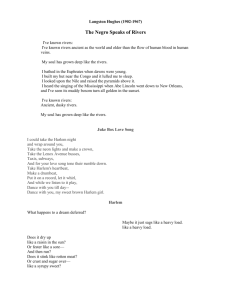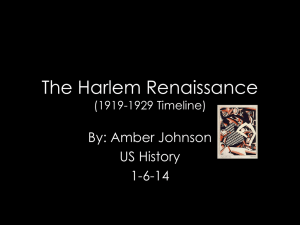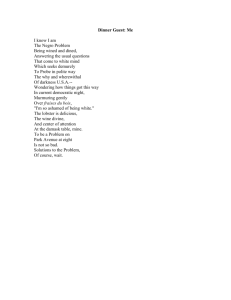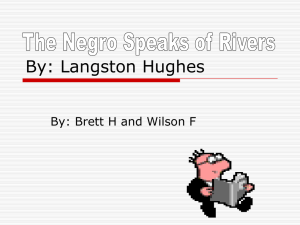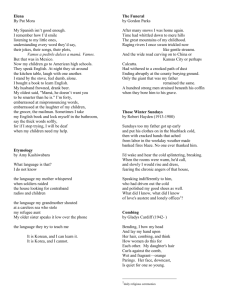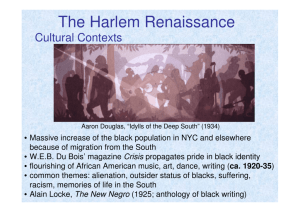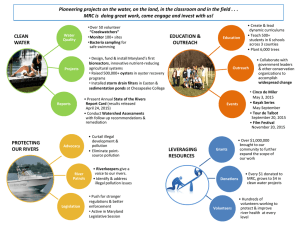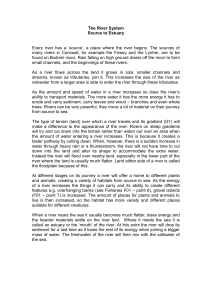People of the Harlem Renaissance
advertisement
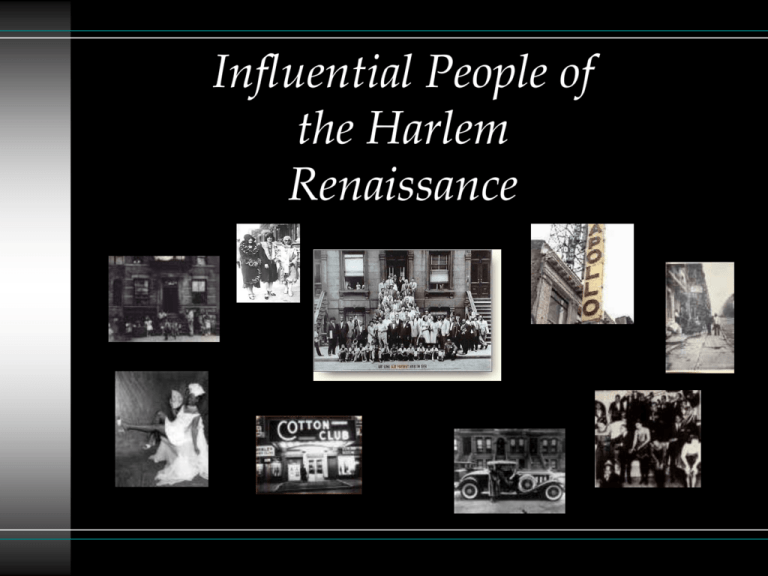
Influential People of the Harlem Renaissance The New Negro “From 1920 until about 1930 an unprecedented outburst of creative activity among AfricanAmericans occurred in all fields of art. Primarily known as The New Negro Movement, the Harlem Renaissance was more than a literary movement and more than a social revolt against racism, This era exalted the unique culture of AfricanAmericans and redefined African-American expression.” -Alaine LeRoy Locke Contributing Factors • Great migration of African-Americans to NY City, Chicago, and Washington, D.C.. • Trends in American society as a whole toward experimentation during the 1920s and the rise of radical black intellectuals such as Marcus Garvey, W.E.B DuBois, and Alaine LeRoy Locke. John Coltrane Born September 23, 1926 in Hamlet, NC. His interest in music was sparked at an early age. He play the clarinet for a number of years before becoming interested in the saxophone. He was called to military service and played in the U.S. Navy Band in Hawaii during WWII. Coltrane performed with individuals such as Dizzy Gillespie, Jimmy Heath, and later in life Miles Davis. He earned several awards during his life time. His album “My Favorite Things” became a certified Gold Album He was awarded the Grammy Award of “Best Jazz Solo Performance” for his album “Bye Bye Blackbird”. He was also awarded the Lifetime Achievement Award. These awards were presented to his wife. He passed away in 1967 after battling with liver disease. William H. Johnson “Harlem scene with full moon” “Jitterbugs II” “Chain Gang” “Swing Low Sweet Chariot” “Moon Over Harlem” “Street Life Harlem” o Johnson was born in Florence, SC in 1901. o He produced hundreds of works in a virtuosic career that spanned over several decades as well as several continents. o Working a part time job after moving to New York at the age of 17, he saved up enough money to attend the National Academy of Design Claude McKay • • • • • • • • Born in Sunny Ville, Jamaica on September 15, 1890. He was the youngest of eleven children. He began writing poetry at the age of ten. He immigrated to the United States in 1912, after he had established himself as a poet. He enrolled at Tuskegee Institute where he first encountered the reality of American racism. He became the editor of The Liberator. In the summer of 1919 he wrote the poems, “If We Must Die” and “The White House” among many others. He became a U.S. citizen in 1940. “The White House” Your door is shut against my tightened face And I am sharp as steel with discontent; But I possess the courage and the grace To bear my anger proudly and unbent The pavement slabs, down the decent street; And passion rends my vitals as I pass, Where boldly shines your shuttered door of glass, Oh, I must search for wisdom every hour, Deep in my wrathful bosom sore and raw, And find in it the superhuman power To hold me to the letter of your law! Oh, I must keep my heart inviolate Against the potent poison of your hate. Langston Hughes • Born James Langston Mercer Hughes on February 1, 1902 in Joplin, Missouri. • He was born into a family of abolitionists and prominent African Americans of that time. • Hughes was a outstanding author of many plays, short stories, and poems. • Some of my favorite works are: “A Dream Deferred” “I, Too” “Negro Speaks of Rivers” Negro Speaks of Rivers I've known rivers: I've known rivers ancient as the world and older than the flow of human blood in human rivers My soul has grown deep like the rivers. I bathed in the Euphrates when dawns were young I built my hut near the Congo and it lulled me to sleep. I looked upon the Nile and raised the pyramids above it. I heard the singing of the Mississippi when Abe Lincoln went down to New Orleans, and I've seen its muddy bosom turn all golden in the sunset I've known rivers: Ancient, dusky rivers. My soul has grown deep like the rivers Duke Ellington • Born April 29, 1899 in Washington, D.C. • He was taught at a young age an understanding of the emotional power of music. • He went Armstrong Manual Training School. • He dropped out of school three months before graduating to pursue a professional music career. • He worked with several popular musicians such as Miles Davis, Louis Armstrong, Dizzy Gillespie, among others. • He performed for influential individuals such as Queen Elizabeth II and President Nixon. • He passed away in 1974. Countee Cullen • • • • • Born in 1903 in Louisville, Kentucky. Grew up in a predominantly white community. He began writing poetry at the age of fourteen. His works were published in The Crisis. When he was a sophomore at NYU, he was awarded second place in the Witter Bynner Poetry Contest for “The Ballad of the Brown Girl.” • He published two collections of own work. • “Yet Do I Marvel” and “Incident” being among his most popular works. Incident Once riding in old Baltimore, Heart-filled, head filled with glee, I saw a Baltimorean Keep looking straight at me, Now I was eight and very small And he was no whit bigger, And so I smiled, but he poked out His tongue and called me, “Nigger.” I saw the whole of Baltimore From May until December: Of all the things that happened there That’s all that I remember.

